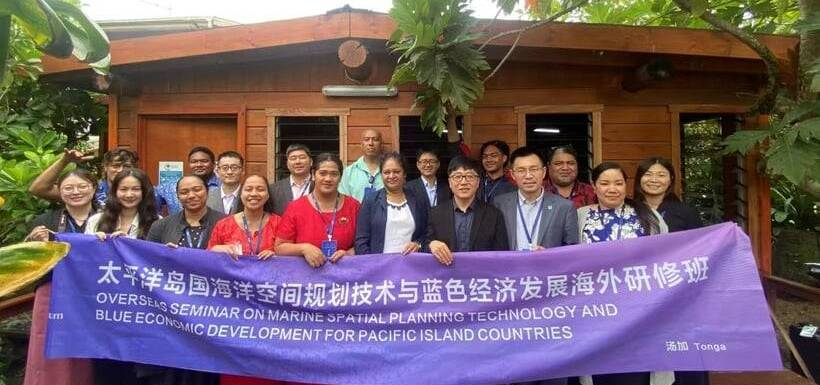News
On May 19th, Pan Xinchun, Deputy President and Secretary-General of China Oceanic Development Foundation, has been invited to visit the North China Sea Branch of Ministry of Natural Resources. Pan Xinchun and his entourage first visited the North China Sea Forecast Center and the electronic model of emergency rescue for offshore workers and exchanged views with relevant comrades on the construction of Environmental Monitoring Station and Marine Science Popularization Base in the Wheat Island. Later, Pan Xinchun gave a lecture on "Practice and Consideration of Territorial Spatial Planning" in the Academic Lecture Hall of Complex Building of North China Sea Branch, and Guo Mingke, Director of North China Sea Branch of Ministry of Natural Resources, presided over the lecture. There were one main venue and six branch venues, with more than 270 participants including leaders of the North China Sea Branch, all the staff of the organ, cadres above the middle-level, and staff with senior technical titles or above of subordinate units.
 The picture shows Pan Xinchun and his entourage visiting the electronic model of emergency rescue for offshore workers
The picture shows Pan Xinchun and his entourage visiting the electronic model of emergency rescue for offshore workers
Pan Xinchun started his speech by pointing out that the CPC Central Committee and the State Council have attached great importance to the establishment of a territorial spatial planning system and the supervision of its implementation. To this end, the China Oceanic Development Foundation has carried out three tasks: First, set up a Maritime Silk Road Project to promote marine spatial planning and contribute to the development of blue economy and the construction of the Belt and Road Initiative; Second, build a platform for the Marine Spatial Planning Academy and implement the Maritime Silk Road Project; Third, carry out research on territorial spatial planning and support the introduction of China's spatial planning solutions to the Belt and Road Initiative countries. Pan Xinchun shared his thoughts on territorial spatial planning around the practice of spatial planning of China Oceanic Development Foundation. In particular, he focused on the tasks, contents, requirements, basic research, optimization of spatial pattern and use control, determination of "three spaces" (spaces for production, living, and ecological), restoration and improvement of land space, allocation of regional infrastructure and public service facilities, planning of the central city and key areas, and construction of basic information platform (database), etc. In addition, Pan Xinchun also gave a detailed introduction to the eight major projects of China Oceanic Development Foundation, such as the Maritime Silk Road Project that "promotes marine spatial planning to contribute to the development of blue economy", the Bridge and Link Project that "gathers marine high-tech resources to contribute to the high-quality economic development" , the Dialogue and Exchange Project that "builds a high-end marine communication platform to enhance China's marine speech rights", the Consultation and Suggestion Project that "focuses on major marine issues to assist the construction of marine governance system", the Sea Rights Education Project that "preaches knowledge about marine rights and diplomacy to stimulate college students' maritime national sentiment", the Marine Talents-Training Project that "donates marine libraries and trains young talents", the Ecological Construction Project of "guarding the beautiful shoreline, we act together", and the Marine Culture Project that "publicizes the achievements of marine civilization and tells the stories of China's sea". He hoped to dovetail and integrate with the relevant work of the North China Sea Branch, making joint efforts to promote the high-quality development of the marine economy.
 The picture shows Pan Xinchun giving a lecture on "Practice and Consideration of Territorial Spatial Planning"
The picture shows Pan Xinchun giving a lecture on "Practice and Consideration of Territorial Spatial Planning"
At the end of the lecture, Pan Xinchun interacted with the on-site personnel and exchanged views on specific issues such as the time sequence relationship between the overall spatial planning, special planning and detailed planning, the supervision and implementation of existing marine functional zoning, and the cooperation of relevant projects of China Oceanic Development Foundation. The audience appreciated Professor Pan for his wonderful lecture, saying that they have learned and benefited a lot. The whole lecture had a positive and active atmosphere, with a good training effect.
 The picture shows the audience asking questions on the site
The picture shows the audience asking questions on the site
Guo Mingke presided over the lecture and made a concluding speech. He pointed out that territorial spatial planning is a guide for national spatial development, a spatial blueprint of sustainable development, and a basis for all kinds of development, protection and construction activities. It is a major strategic deployment by the CPC Central Committee and the State Council to establish and supervise the implementation of the national territorial spatial planning system, to realize the "multi-regulation integration", and strengthen the guiding and restraining role of national territorial spatial planning in various special plans. The lecture from Professor Pan gave the comrades of the North China Sea Branch a brand-new and systematic understanding on the planning and construction of national spatial system, which provided very important guidance and reference for the study on the construction of a territorial spatial planning system and the solutions of problems such as the inadequate ownership of natural resources and overlapping spatial planning. All units and departments under the Branch need to further strengthen learning and thinking to grasp the gists of carrying out marine administrative supervision, marine ecological restoration and promoting regional economic and social development in the new era, providing more new ideas and methods for the implementation of the new development concepts and the construction of a new development pattern and effectively implementing the new "two unified duties (unified all duties of all natural resources assets ownership and unified all duties of territorial space use control and ecological protection and restoration)" of the North China Sea Branch.
 The picture shows Guo Mingke giving a concluding speech
The picture shows Guo Mingke giving a concluding speech

- Marine Spatial Planning Study Tour 2023 Officially Launched
- President Lv Bin Met with Her Royal Highness of Tonga Pilolevu Tuita in Beijing and Signed a Memorandum of Understanding on Cooperation
- Dialogue eyes key role of youth in RCEP region's growth
- Pan Xinchun Attends the 2022 China Ocean Action Roundtable and Introduces Ten Major Actions



 Home
Home  About Us
About Us  Our Programs
Our Programs  Cooperative Partner
Cooperative Partner